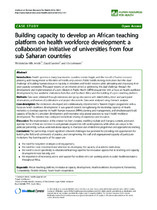Building capacity to develop an African teaching platform on health workforce development: a collaborative initiative of universities from four sub Saharan countries

View/
Date
2014Author
Amde, Woldekidan Kifle
Sanders, David
Lehmann, Uta
Metadata
Show full item recordAbstract
INTRODUCTION: Health systems in many low-income countries remain fragile, and the record of human resource planning and management in Ministries of Health very uneven. Public health training institutions face the dual challenge of building human resources capacity in ministries and health services while alleviating and improving their own capacity constraints. This paper reports on an initiative aimed at addressing this dual challenge through the development and implementation of a joint Masters in Public Health (MPH) programme with a focus on health workforce
development by four academic institutions from East and Southern Africa and the building of a joint teaching platform.
METHODS: Data were obtained through interviews and group discussions with stakeholders, direct and participant observations, and reviews of publications and project documents. Data were analysed using thematic analysis.
CASE DESCRIPTION: The institutions developed and collaboratively implemented a ‘Masters Degree programme with a focus on health workforce development’. It was geared towards strengthening the leadership capacity of Health ministries to develop expertise in health human resources (HRH) planning and management, and simultaneously build capacity of faculty in curriculum development and innovative educational practices to teach health workforce development. The initiative was configured to facilitate sharing of experience and resources.
DISCUSSION: The implementation of this initiative has been complex, straddling multiple and changing contexts, actors and agendas. Some of these are common to postgraduate programmes with working learners, while others are unique to this
particular partnership, such as weak institutional capacity to champion and embed new programmes and approaches to teaching.
CONCLUSIONS: The partnership, despite significant inherent challenges, has potential for providing real opportunities for building the field and community of practice, and strengthening the staff and organizational capacity of participant institutions. Key learning points of the paper are:
*the need for long-term strategies and engagement;
*the need for more investment and attention to developing the capacity of academic institutions;
*the need to invest specifically in educational/teaching expertise for innovative approaches to teaching and capacity development more broadly; and
*the importance of increasing access and support for students who are working adults in public health institutions throughout Africa.
